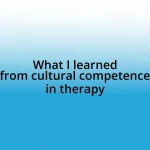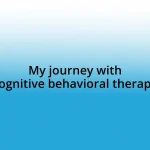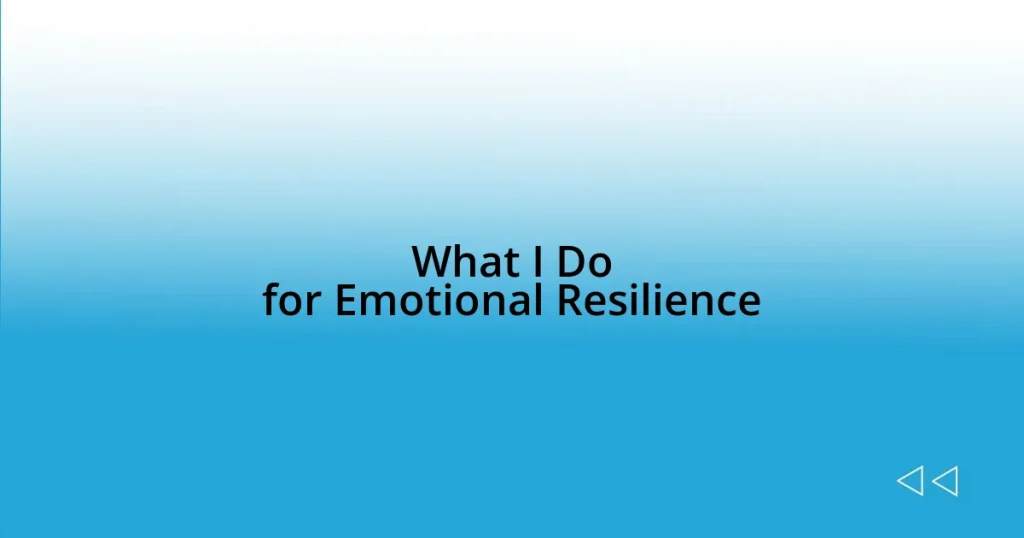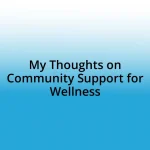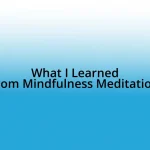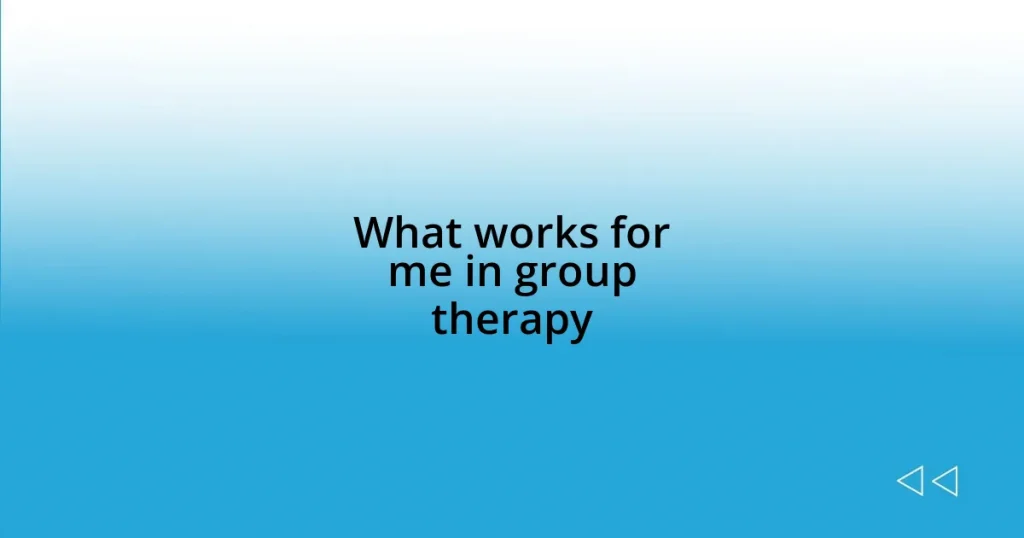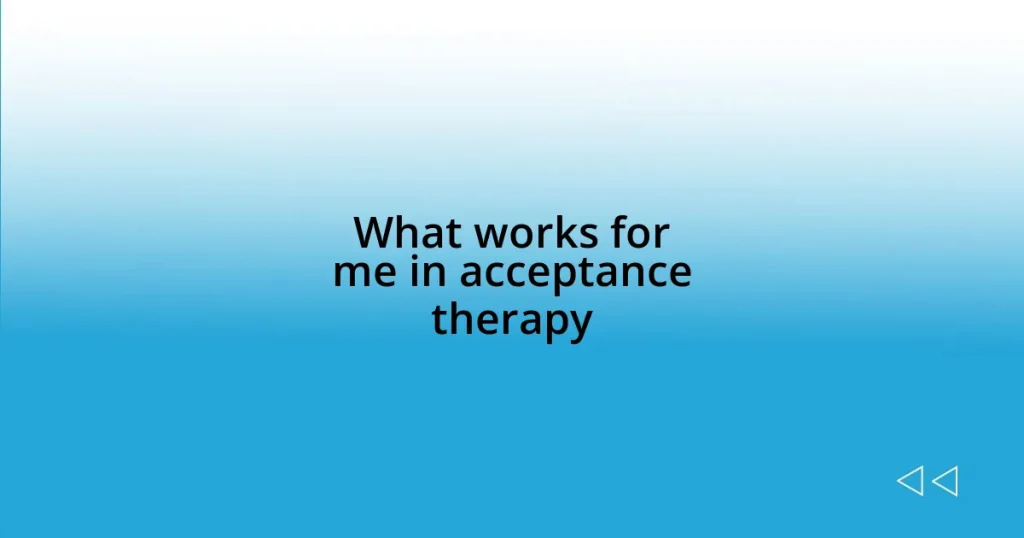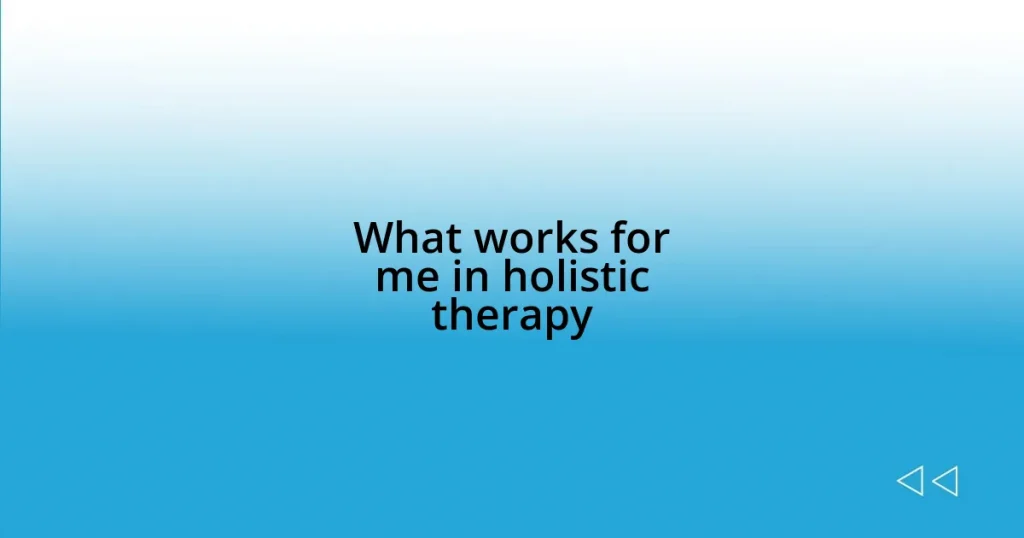Key takeaways:
- Emotional resilience involves acknowledging and processing emotions, turning vulnerability into strength, and enhancing connections with others.
- Practical strategies for building resilience include physical activity, mindfulness, setting realistic goals, practicing gratitude, and seeking support from others.
- Daily habits, such as reflection, physical movement, and continuous learning, contribute significantly to fostering resilience and emotional strength.
- Effective response to setbacks includes reframing challenges as growth opportunities and celebrating small victories to maintain balance and motivation.
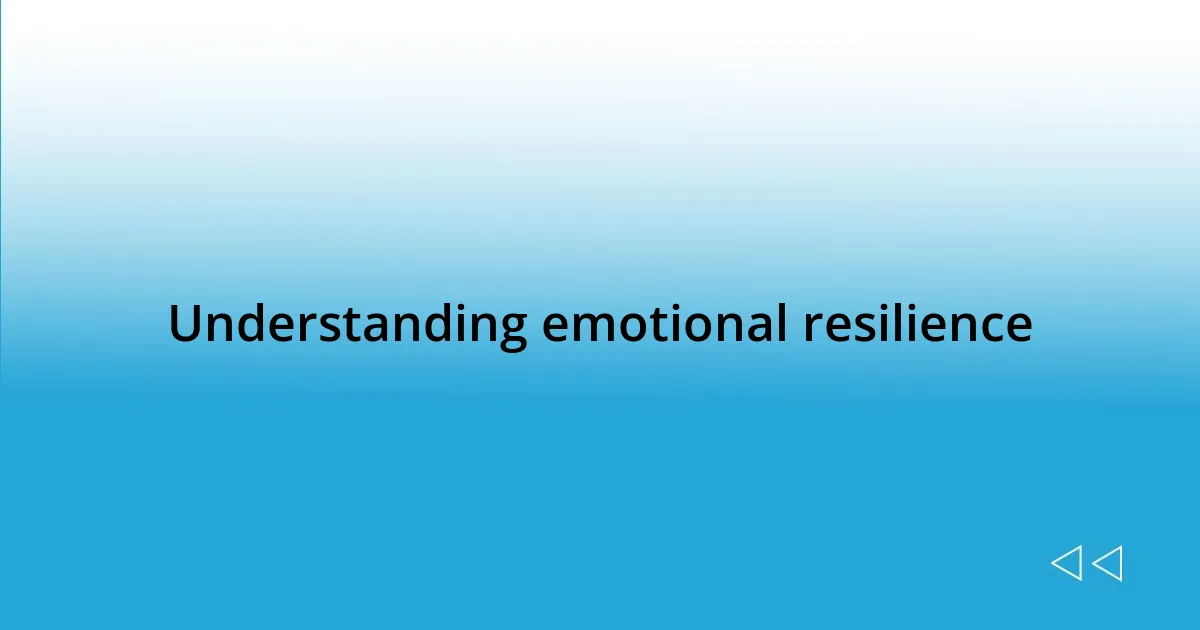
Understanding emotional resilience
Emotional resilience is like a protective shield that helps us navigate life’s ups and downs. It’s fascinating how some people bounce back from setbacks while others struggle to regain their footing. I remember a time when I faced a significant career setback—my initial reaction was despair. But by leaning into my emotions and reflecting on what I could learn, I developed a deeper understanding of resilience.
When I think about emotional resilience, I realize it’s not just about “toughing it out.” It’s about allowing yourself to feel and process emotions without judgment. Have you ever noticed how acknowledging our vulnerabilities can be a source of strength? I found that when I openly discussed my feelings with friends, it didn’t weaken me; it connected me with others who had similar struggles.
Building emotional resilience is an ongoing journey, and I believe it requires active reflection and self-care. For instance, I started keeping a journal to track my emotional responses—a simple tool that changed everything for me. Have you ever tried journaling? It not only helped me clarify my thoughts but also allowed me to recognize patterns in my emotional responses, enhancing my ability to cope with future challenges.
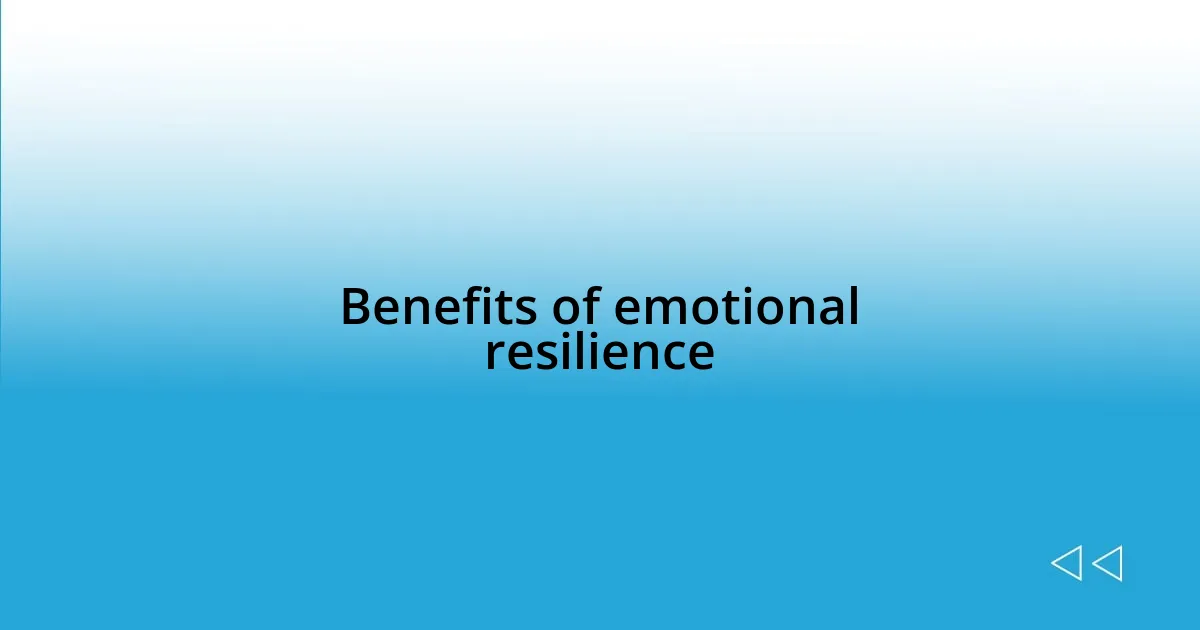
Benefits of emotional resilience
Emotional resilience has numerous benefits that can significantly impact our quality of life. For instance, one of the standout advantages I’ve noticed is improved emotional regulation. When I faced moments of stress, like during a challenging project at work, my ability to pause and assess my feelings made all the difference. Those moments weren’t just manageable; they became opportunities for growth, teaching me how to handle pressure more effectively.
Another benefit is the enhancement of relationships. I’ve found that emotional resilience allows for better communication with loved ones. When I navigate my own feelings, I become more open to understanding theirs. This shift transformed my interactions, creating deeper connections. Have you ever felt a shift in a relationship after sharing your emotional struggles? It’s liberating to feel supported, and my friendships have flourished because of this mutual understanding.
Lastly, high emotional resilience contributes to better overall well-being. I’ve seen how managing my emotions effectively lowers my anxiety levels. For example, during a period when I was juggling personal and professional responsibilities, practicing mindfulness techniques helped me stay grounded. This practice not only eased my anxiety but also made it easier to enjoy daily life’s simple pleasures.
| Benefit | Description |
|---|---|
| Improved Emotional Regulation | Ability to manage emotions effectively in stressful situations, leading to personal growth. |
| Enhanced Relationships | Better communication and understanding with loved ones, fostering deeper connections. |
| Increased Well-being | Lower anxiety levels and a heightened ability to enjoy life’s simple pleasures. |
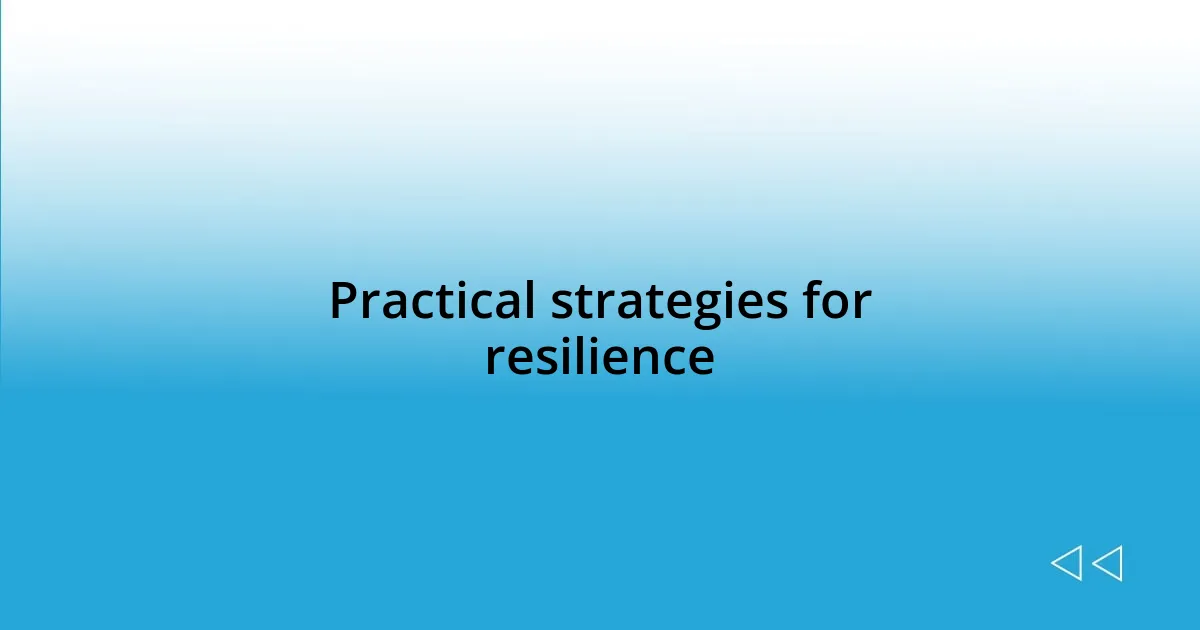
Practical strategies for resilience
When it comes to practical strategies for resilience, I’ve discovered that being proactive often yields the best results. For instance, developing a routine that incorporates physical activity has been a game-changer for me. On days when life feels overwhelming, I make a point to go for a walk or practice yoga. I’ve found that moving my body helps release built-up tension, allowing me to regain clarity and perspective. It’s amazing how something as simple as a brisk walk can refresh my mind and energize my spirit.
Here are some practical strategies I’ve embraced that can boost resilience:
- Connect with Nature: Spending time outdoors, whether through hiking or just sitting in a park, provides a calming effect.
- Mindfulness Meditation: Taking a few quiet moments to breathe and center myself allows me to focus and ease anxiety.
- Set Realistic Goals: Breaking down large tasks into smaller, manageable steps helps prevent feelings of being overwhelmed.
- Practice Gratitude: Keeping a gratitude journal helps shift my focus from challenges to the positive aspects of my life, fostering a more optimistic outlook.
- Seek Support: Having a go-to person to talk to about my experiences creates a sense of belonging and understanding.
Each of these strategies has become an integral part of my resilience toolkit. They not only enhance my emotional well-being but also empower me to face life’s challenges head-on. I encourage you to experiment with these options and discover what resonates with you. After all, resilience is very much about finding your own path to strength.
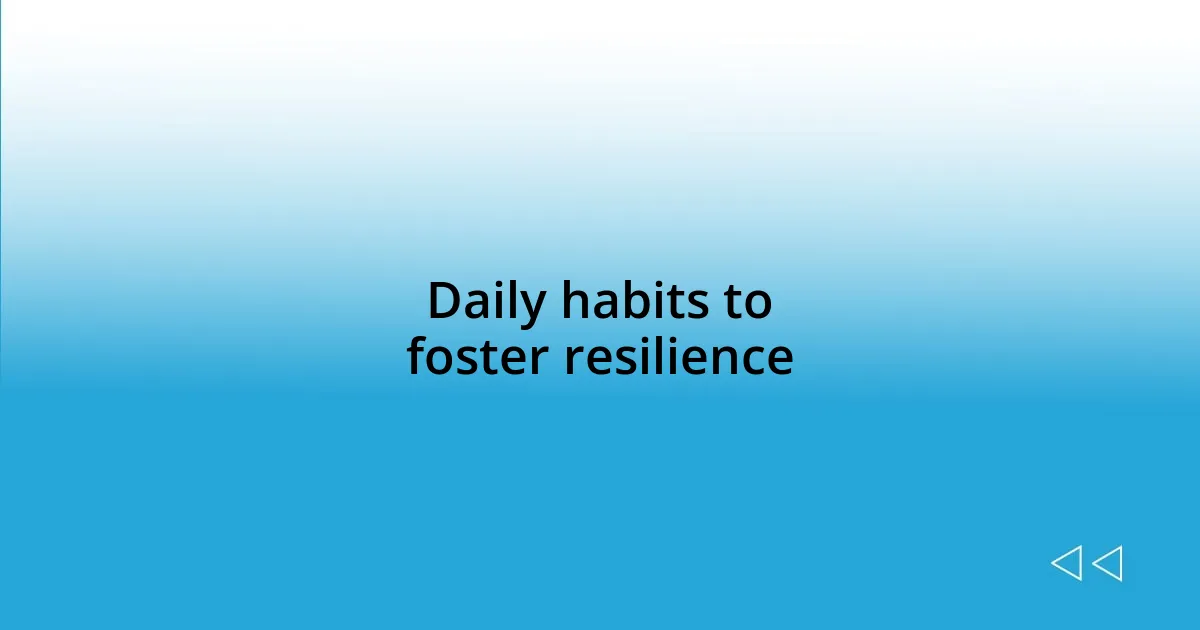
Daily habits to foster resilience
In my daily routine, I prioritize starting the morning with a moment of reflection. I found that simply sipping my coffee in silence, thinking about what I’m grateful for, sets a positive tone for my day. Have you tried this? The shift from rush to gratitude can work wonders in sharpening my focus and keeping negativity at bay.
Physical activity plays a crucial role in my resilience toolbox as well. On days when I’m feeling particularly weighed down, I’ll lace up my sneakers and head outside. I remember a time after a tough meeting, feeling drained. But a quick run outside revitalized not just my body but my mindset. The fresh air and movement allowed me to process my frustration and return to my tasks with renewed energy.
I also make it a habit to learn something new each week. It could be a simple recipe or a quick online course. Embracing growth in small, manageable doses helps build my confidence. When I challenge myself, I feel less like a victim of circumstances and more empowered. Do you see how this curiosity can bolster resilience? By constantly learning, I not only distract myself from stress but also create a sense of achievement that fuels my emotional strength.
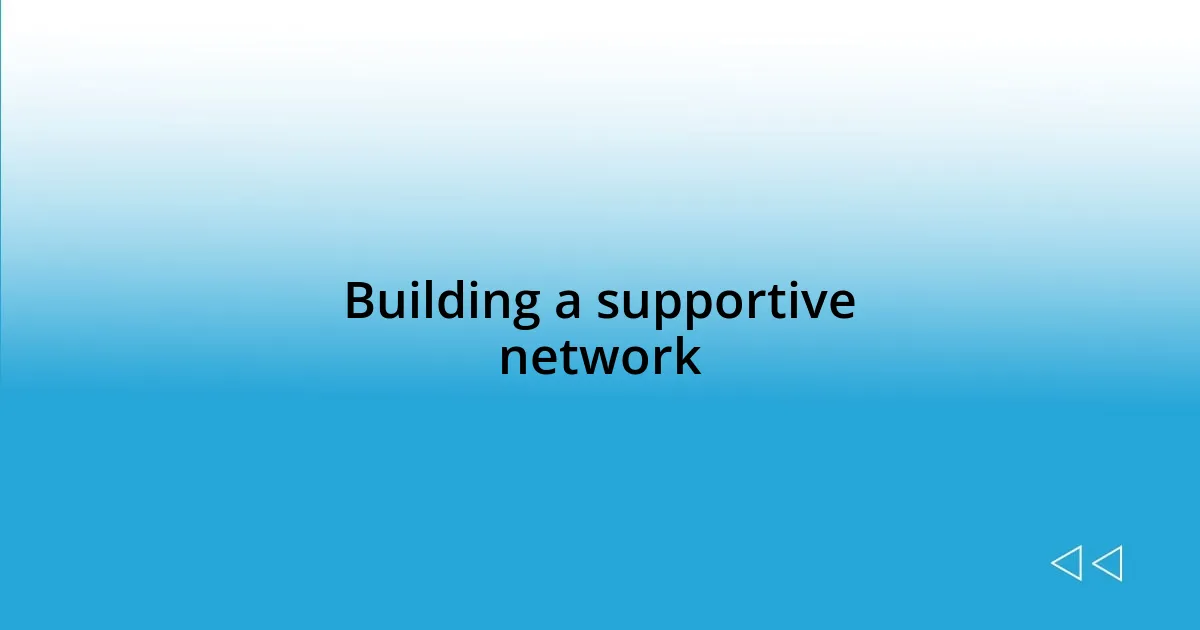
Building a supportive network
Building a supportive network has been a crucial part of my emotional resilience journey. I vividly recall a particularly challenging period when I felt lost and overwhelmed. It was a friend’s simple text, just checking in, that spiraled into a long phone call. Sharing my struggles not only alleviated my burden but also reminded me that I was not alone in feeling this way. Have you ever noticed how just letting someone in can lighten your emotional load?
Creating a diverse network is something I’ve found invaluable. I aim to surround myself with people from various backgrounds—friends, family, and even colleagues. Each brings different perspectives and support, which helps me tackle problems from different angles. I remember discussing a tough decision with a mentor and receiving insights that I hadn’t considered. It made me appreciate how much richer our lives become when we allow different voices to contribute.
I firmly believe that reaching out can be as simple as sending a text or planning a coffee catch-up. The act of being vulnerable and expressing our feelings isn’t always easy, but it’s so worth it. Just last week, I reached out to an old friend I hadn’t spoken to in years. The conversation flowed effortlessly, and by the end, I felt rejuvenated. Have you ever had that feeling when reconnecting? It’s a reminder that, while we all face challenges, there’s strength in community, and fostering these connections can bolster our emotional resilience in ways we might not expect.
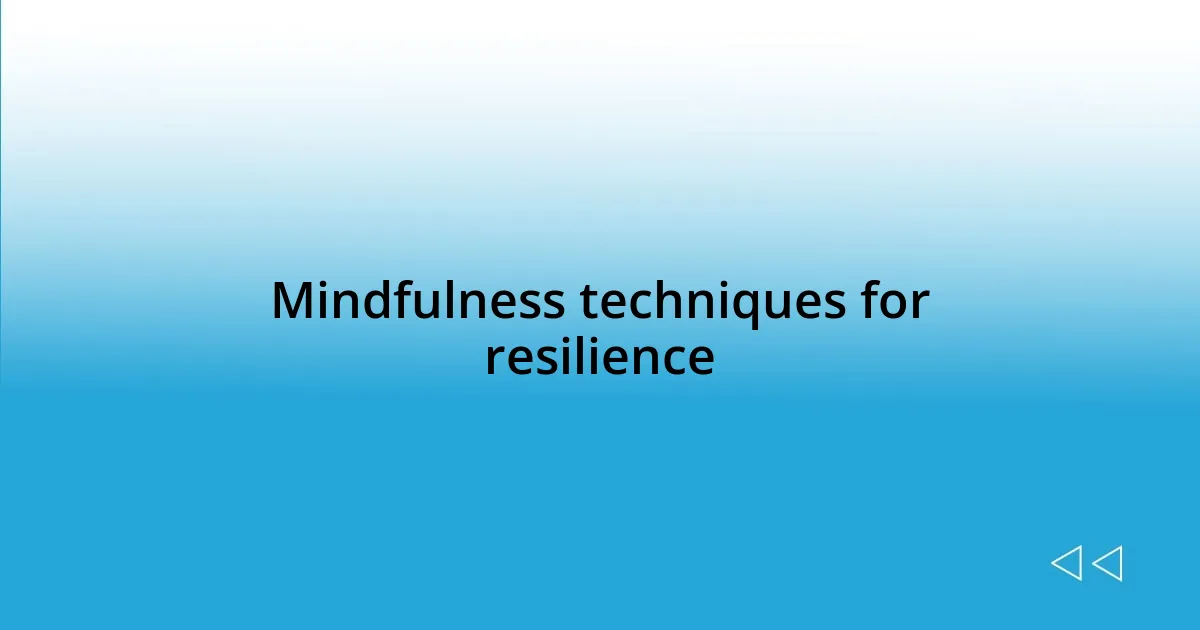
Mindfulness techniques for resilience
Mindfulness techniques have become my sanctuary for navigating life’s ups and downs. One effective approach I use is mindful breathing, especially during overwhelming moments. I recall being caught in a stressful situation, where my thoughts raced and anxiety crept in. Taking a few deep breaths, counting to five as I inhale and exhale, helped me center myself. Have you ever noticed how just a moment of focused breathing can completely shift your perspective?
Another cherished technique is body scanning, where I consciously observe physical sensations throughout my body. I remember lying down one evening after an exhausting day, and instead of succumbing to fatigue, I focused on each body part, releasing tension as I went. This practice not only relaxed me but also revealed areas I often overlook, like tight shoulders or a clenched jaw. It’s a remarkably powerful way to reconnect with myself. Have you tried tuning into your body and recognizing where you hold stress?
Additionally, I’ve found that gratitude journaling ties in beautifully with mindfulness. Every night, I jot down three things I appreciated that day, no matter how small. This act of reflection serves as a gentle reminder to focus on the positive amid challenges. I vividly remember a day filled with unexpected hurdles, but as I wrote, I realized how a friendly chat with a colleague and a warm cup of tea brightened my mood. By shifting my focus to gratitude, I felt more resilient and equipped to face whatever tomorrow might bring. Isn’t it fascinating how such a simple practice can transform our mindset?
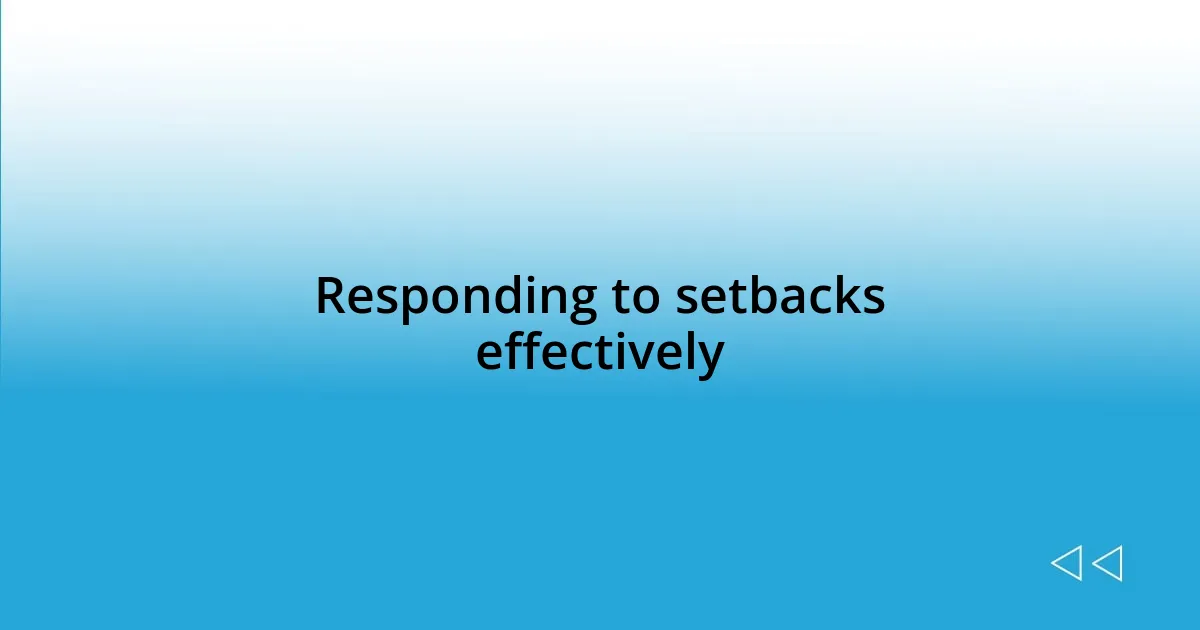
Responding to setbacks effectively
Responding to setbacks effectively has been a crucial skill in my emotional resilience toolkit. I remember a time when I failed to secure a job I really wanted. At first, I felt crushed, but I decided to treat it as a learning opportunity. I spent a few hours reflecting on the interview feedback and jotting down areas for improvement. It made me wonder, have you ever paused to see a setback as a stepping stone rather than a roadblock?
One technique that’s proved invaluable to me is to reframe setbacks as part of my growth journey. For instance, when a personal project didn’t go as planned, I took a step back and analyzed the missteps. Instead of wallowing in disappointment, I hosted a mini-debrief with myself—what went well, what didn’t, and what can I do differently next time? It’s such an enlightening process, and I often ask myself, how can I turn this setback into a lesson that propels me forward?
Sometimes, I find it essential to celebrate small victories amid setbacks. Recently, after facing a tough project deadline that slipped through my fingers, I decided to treat myself to a nice dinner. It was my way of acknowledging that while not everything goes according to plan, there are still moments to celebrate. Have you taken the time to reward yourself after a challenging experience? It’s all about maintaining balance and remembering that each setback can teach us something valuable on our path to resilience.







